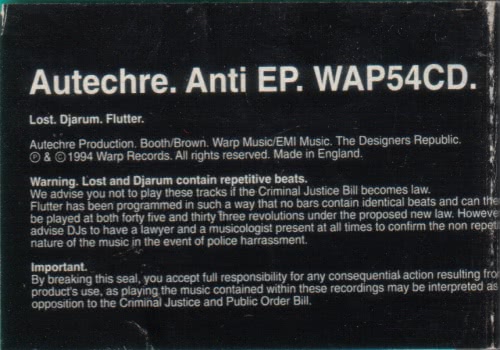It’s been almost 25 years since the UK Government tried to ban raves

24 years ago the UK Government attempted to make rave culture illegal with a law that banned public performance of music “wholly or predominantly characterised by the emission of a succession of repetitive beats”; essentially trying to criminalise EDM music itself.
No, the aforementioned is not some suggested public order from a septuagenarian who doesn’t her nightly knitting soundtracked by sick beats. Britain’s Parliament passed the Criminal Justice and Public Order act on November 3, 1994. It granted police the power to confiscate sound systems, interfere with groups of people suspected of setting up raves, and turn back revellers who are within a 1.6km radius of an offending site.
Remind anyone of a certain current Australian law?
Another section of the act was Part V, ‘Public Order: Collective Trespass or Nuisance on Land’. It was essentially brought into place to give police the right to remove “squatters” in the midst of the “traveller” movement.
According to Spin, the Public Order was said to be sparked by a mass rave in 2002 when an estimated 20,000 party-goers took over Castlemorton Common for a six-day rave. Now known as “the rave that changed the law”, the invite was sent out via an answering machine message which said: “Right, listen up revellers. It’s happening now and for the rest of the weekend, so get yourself out of the house and on to Castlemorton Common… Be there, all weekend, hardcore.”

The rave that changed the law. Castlemorton Common (1992)
Amazingly, electronic duo Autechre saw a loophole in the attempt to quash the free party movement. They issued a track, ‘Flutter’, in which no two bars have the same beat. The duo’s Anti EP was even affixed with a warning sticker advising fans not to play two of its tracks publicly because of their repetitive beats:
“Warning. ‘Lost’ and ‘Djarum’ contain repetitive beats. We advise you not to play these tracks if the Criminal Justice Bill becomes law. ‘Flutter’ has been programmed in such a way that no bars contain identical beats and can therefore be played under the proposed new law. However, we advise DJs to have a lawyer and a musicologist present at all times to confirm the non-repetitive nature of the music in the event of police harassment.”

Anti EP warning sticker
This article originally appeared on The Industry Observer, which is now part of The Music Network.






























